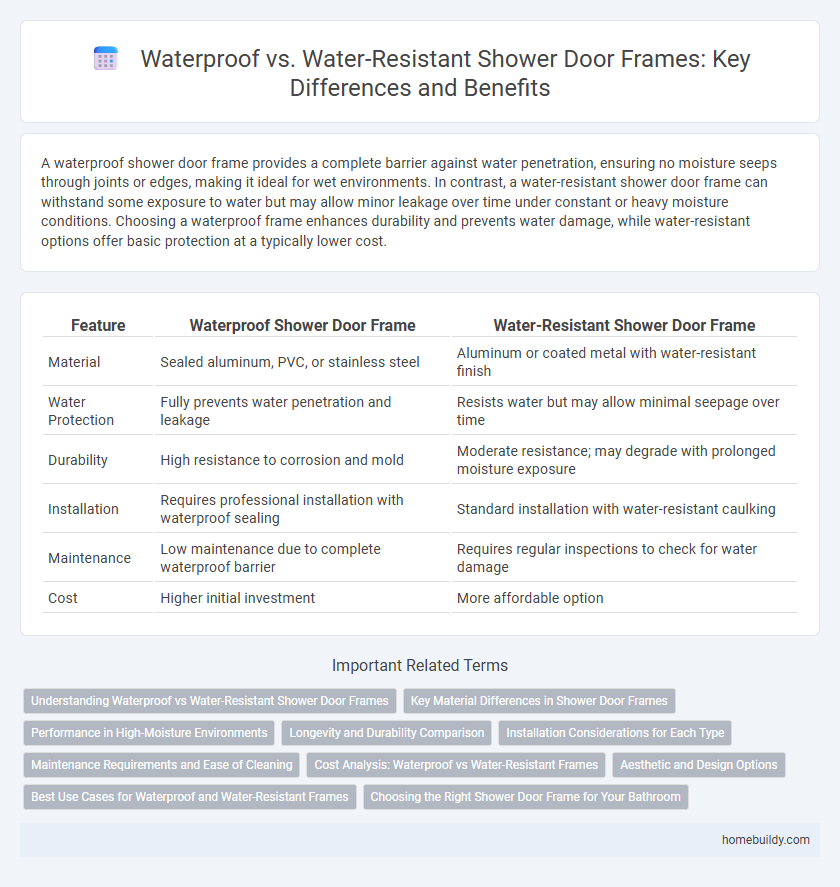A waterproof shower door frame provides a complete barrier against water penetration, ensuring no moisture seeps through joints or edges, making it ideal for wet environments. In contrast, a water-resistant shower door frame can withstand some exposure to water but may allow minor leakage over time under constant or heavy moisture conditions. Choosing a waterproof frame enhances durability and prevents water damage, while water-resistant options offer basic protection at a typically lower cost.
Table of Comparison
| Feature | Waterproof Shower Door Frame | Water-Resistant Shower Door Frame |
|---|---|---|
| Material | Sealed aluminum, PVC, or stainless steel | Aluminum or coated metal with water-resistant finish |
| Water Protection | Fully prevents water penetration and leakage | Resists water but may allow minimal seepage over time |
| Durability | High resistance to corrosion and mold | Moderate resistance; may degrade with prolonged moisture exposure |
| Installation | Requires professional installation with waterproof sealing | Standard installation with water-resistant caulking |
| Maintenance | Low maintenance due to complete waterproof barrier | Requires regular inspections to check for water damage |
| Cost | Higher initial investment | More affordable option |
Understanding Waterproof vs Water-Resistant Shower Door Frames
Waterproof shower door frames are engineered to completely prevent water penetration, typically constructed with sealed joints, durable materials like aluminum or stainless steel, and specialized coatings to ensure no moisture infiltration. Water-resistant shower door frames offer limited protection by reducing water exposure but may allow minor seepage over time due to less robust sealing or materials. Choosing a truly waterproof frame ensures maximum durability and prevents mold or water damage, while water-resistant options provide moderate protection often suited for low-moisture environments.
Key Material Differences in Shower Door Frames
Waterproof shower door frames are typically constructed from materials like aluminum with a powder-coated finish or vinyl, providing a complete barrier against moisture penetration. Water-resistant frames often use treated wood or standard aluminum without specialized coatings, allowing for limited exposure to moisture but not full waterproofing. The key material difference lies in the frame's ability to prevent water absorption and corrosion, directly impacting durability and maintenance in wet environments.
Performance in High-Moisture Environments
Waterproof shower door frames offer superior protection by completely preventing water penetration, ensuring durability and preventing mold growth in high-moisture environments like bathrooms. Water-resistant frames provide a barrier that slows water absorption but may allow some moisture over time, which can lead to corrosion or damage in extreme humidity. Selecting a fully waterproof frame enhances long-term performance and maintenance ease in consistently wet conditions.
Longevity and Durability Comparison
Waterproof shower door frames offer superior longevity and durability by completely preventing water infiltration, which minimizes corrosion and structural damage over time. Water-resistant frames provide a barrier that slows water penetration but may allow moisture buildup, increasing the risk of rust and material degradation with prolonged exposure. Investing in waterproof frames ensures enhanced protection in high-moisture environments, extending the lifespan of the shower enclosure significantly.
Installation Considerations for Each Type
Waterproof shower door frames require precise sealing and often use silicone or rubber gaskets during installation to ensure complete water impermeability, preventing leaks in high-moisture environments. Water-resistant shower door frames are designed to withstand splashes and humidity but may rely on less intensive sealing methods, making installation quicker and less complex while still providing adequate protection. Proper alignment and fastening are critical for both types to maintain structural integrity and functionality over time.
Maintenance Requirements and Ease of Cleaning
Waterproof shower door frames require minimal maintenance due to their complete impermeability, preventing any water seepage or mold buildup. Water-resistant frames need more frequent upkeep to address potential water infiltration and staining, as their materials only repel moisture rather than block it entirely. Cleaning waterproof frames is generally easier since grime and soap scum do not penetrate, while water-resistant frames may require regular scrubbing and protective treatments to maintain their appearance.
Cost Analysis: Waterproof vs Water-Resistant Frames
Waterproof shower door frames typically cost 20-30% more than water-resistant ones due to advanced sealing materials and installation requirements that ensure complete water impermeability. Water-resistant frames offer a budget-friendly option with moderate protection, suitable for low-exposure areas but may incur additional maintenance costs over time. Investing in waterproof frames can reduce long-term expenses by minimizing water damage and subsequent repairs, providing better value despite the higher upfront price.
Aesthetic and Design Options
Waterproof shower door frames typically offer sleek, seamless designs that enhance modern bathroom aesthetics with minimal visible seams or grout lines, ensuring a cleaner look. Water-resistant frames provide more design flexibility, often available in a wider range of materials and finishes, catering to various styles from traditional to contemporary. The choice between waterproof and water-resistant frames influences both the visual appeal and the durability of shower enclosures in moisture-prone environments.
Best Use Cases for Waterproof and Water-Resistant Frames
Waterproof shower door frames are ideal for high-moisture environments like steam showers or bathrooms with heavy daily use, providing complete protection against water infiltration and preventing mold or corrosion. Water-resistant shower door frames suit moderately damp areas such as guest bathrooms or powder rooms, offering sufficient defense against occasional splashes and humidity while being more cost-effective. Selecting between these frames depends on bathroom usage intensity and exposure to water, ensuring durability and maintenance efficiency.
Choosing the Right Shower Door Frame for Your Bathroom
Waterproof shower door frames are constructed with materials and seals that prevent any water penetration, offering complete protection against leaks and moisture damage in high-humidity environments. Water-resistant shower door frames provide a barrier that inhibits water absorption but may allow minimal moisture exposure over time, suitable for bathrooms with lower humidity levels. Selecting the right shower door frame involves assessing bathroom ventilation, usage frequency, and water exposure to ensure durability and prevent costly repairs.
Waterproof shower door frame vs water-resistant shower door frame Infographic

 homebuildy.com
homebuildy.com